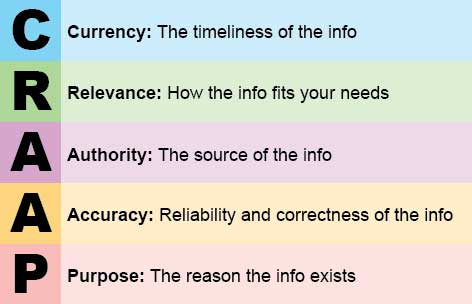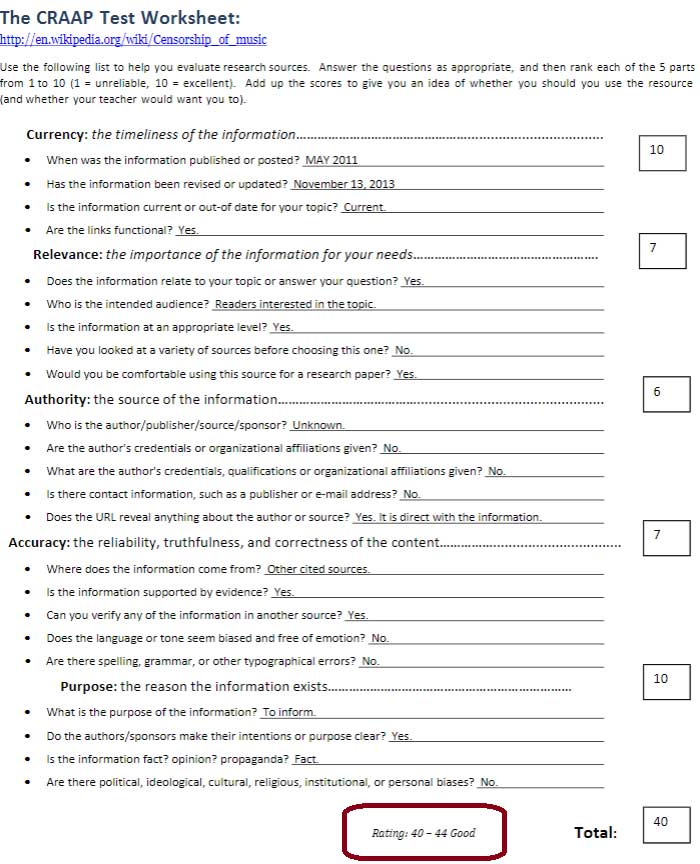Author
ITC – Eduardo Linares and M. Begoña Arenas
Mini Project ID
ITCMP02
Description
The current prevalence of communication and information technologies in all the areas of our lives causes a huge increase of information shared in a digital form. The Internet is an important communication, information, business, advertising, and marketing media.
As we use internet sources more and more often, whether searching for information in connection with our everyday lives like shopping or conducting research in connection with our studies or jobs, to have the ability to better understand, evaluate and differentiate between reliable and unreliable sources has become an absolute must.
There are many techniques and ways how to find reliable sources and avoid the unreliable ones.
One of them is the C.R.A.P test. This test is based on considering a set of criteria.
Sector
Adult education (CPD)
Data
We are asking you to evaluate one website using the CRAAP Test Worksheet: https://en.wikipedia.org/wiki/Music_censorship
USE THE CRAAP TEST WORKSHEET
Use the following list to help you evaluate sources. Answer the questions as appropriate, and then rank each of the 5 parts from 1 to 10 (1 = unreliable, 10 = excellent). Add up the scores to give you an idea of whether you should you use the resource (and whether your boss would want you to!).
Currency: the timeliness of the information
- When was the information published or posted?
- Has the information been revised or updated?
- Is the information current or out of date for your topic?
- Are the links functional?
Relevance: the importance of the information for your needs
- Does the information relate to your topic or answer your question?
- Who is the intended audience?
- Is the information at an appropriate level?
- Have you looked at a variety of sources before choosing this one?
- Would you be comfortable using this source for a research paper?
Authority: the source of the information
- Who is the author/publisher/source/sponsor?
- Are the author’s credentials or organizational affiliations given?
- What are the author’s credentials or organizational affiliations given?
- What are the author’s qualifications to write on the topic?
- Is there contact information, such as a publisher or e-mail address?
- Does the URL reveal anything about the author or source?
Accuracy: the reliability, truthfulness, and correctness of the content
- Where does the information come from?
- Is the information supported by evidence?
- Has the information been reviewed or refereed?
- Can you verify any of the information in another source?
- Does the language or tone seem biased and free of emotion?
- Are there spelling, grammar, or other typographical errors?
Purpose: the reason the information exists
- What is the purpose of the information?
- Do the authors/sponsors make their intentions or purpose clear?
- Is the information fact? opinion? Propaganda?
- Does the point of view appear objective and impartial?
- Are there political, ideological, cultural, religious, institutional, or personal biases?
Model
CRAAP Model

Calculation
Total:
- 45 – 50 Excellent
- 40 – 44 Good
- 35 – 39 Average
- 30 – 34 Borderline Acceptable
- Below 30 – Unacceptable


Review M2S1-S3 – Evaluating the reliability of an online sources to better understand and support my argument.
You must be logged in to post a review.